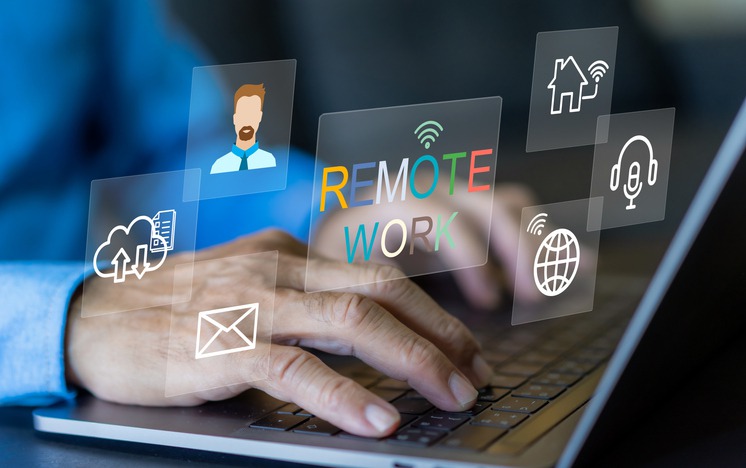Remote employment is growing quickly, and many businesses have employees operating from different locations. Maintaining security while working remotely is necessary to protect confidential information, uphold staff productivity, and preserve trust within a company. Here are some practical guidelines and best practices to organize, manage, and secure remote tasks effectively and protect your information.
What Are the Best Practices for Safety When Employees Work from Home?
Constantly Updating Your Software and Devices
Regular updates to software, operating systems, and applications protect your work devices from new security issues. Software developers consistently release patches to fix vulnerabilities found within programs. Set automatic updates for all tools to make sure they receive the latest improvements immediately.
All devices used for remote activities must be frequently assessed to detect any suspicious activities or malware, avoiding potential threats. As threats become harder to understand, sticking to a strict software update schedule helps keep remote environments protected. Employees and organizations must prioritize this easy step to preserve productive and safe remote operations.
Select Secure and Reliable Networking Solutions for Remote Tasks
Using the right kind of network is vital for protecting information privacy while working away from the office. Public Wi-Fi that is widely available might appear convenient but risks exposing sensitive information if the connection is compromised. Encouraging employees to implement personal Wi-Fi networks with strong encryption, like WPA3, is essential for protecting confidential company data.
A virtual private network (VPN) offers another layer of defense, encrypting all communications and masking employees’ physical locations. VPN services provide safe pathways to handle information securely, regardless of staff location. Therefore, businesses should require employees to use safe home networks and trusted VPNs when connecting remotely.
Maintain Awareness with Regular Employee Training Programs
Providing regular training for employees ensures that everyone understands their responsibilities in keeping work data safe. Frequent educational sessions help identify various threats, including phishing attempts, harmful links, and unwanted access attempts. Educated employees serve as the first line of defense, knowing which practices expose sensitive information and how to prevent them.
Training must cover essential safety practices, the rules of using confidential data, and methods to notice an unusual event and respond accordingly. These training courses must become integral to organization-wide strategies. Moreover, businesses must measure and confirm employees’ practical understanding through regular tests or reviews.
Use Strong Passwords and Two-Factor Authentication
Enforcing a password management system greatly reduces risks associated with weak or stolen passwords. Employees must consistently use strong, complex, and unique passwords for all systems, applications, and when accessing critical company data. Avoiding common passwords and phrases is necessary for improving the security environment.
Two-factor authentication (2FA) provides further security by requiring employees to confirm their identity through another communication method besides simply providing a password. Businesses implementing 2FA solutions significantly decrease hacking risks. Employees should use passwords and authentication responsibly, securing every login point of sensitive resources.
Adopting and Managing Reliable Security Software Solutions
Installing robust security software products protects devices from unwanted intrusions, viruses, and attacks. Reliable antivirus software designed to identify threats plays an integral part in defending against remote activities. Employees must always run recognized software packages, regularly scanning devices to identify malware or suspicious actions.
Using effective web-based firewalls adds a layer of security, blocking risky communications or suspicious website visits initiated by employees. Remote working requires trusting security software suites designed specifically to support secure employee interactions. Employees should understand the correct usage of the firewall and antivirus products provided by the organization.
Safe Use and Handling of Work Emails and Online Messages
Many security issues regarding remote activities often arise from careless emails and messaging interactions. Educating remote workers about carefully opening attachments or clicking provided links in unexpected emails helps reduce phishing threats. Implementing email scanning services to recognize external threats like malware or phishing remains helpful for identifying and managing incoming email-based attacks.
Employees must adopt caution, carefully verifying email sources, reporting potential suspicious communications, and isolating suspicious messages to prevent accidental exposure. Regular reminders and training ensure that email and direct messaging behavior aligns with security best practices, minimizing threats occurring from workplace digital communications.
Secure Management of Confidential Documents and Files
Remote employees often use shared storage, document-sharing applications, and cloud-based storage for collaborating online. Ensuring file encryption and proper permission-based access is essential for ensuring documents’ safety during transit or online storage. Choosing trustworthy cloud storage providers and enabling strong encryption techniques effectively protects files.
Organizations must establish proper policies and select secure file-sharing platforms that guard employees’ information exchange activities. Employees must recognize the risk involved in mishandling data, ensuring they securely transmit, store, and remove files according to organizational policies. Securely handling documents influences the strength of remote work environments.
Reliable Remote Employees for Security and Productivity
Hiring dependable remote staff ensures secure business practices even when your workers operate far from the traditional office. Employees who are trustworthy take data privacy seriously, maintaining organizational security procedures with responsibility and attention. Assessing employees’ past experiences, conducting comprehensive evaluations, and checking references help select reliable team members for remote roles.
Carefully selected staff improve productivity and maintain strict safety practices. Planning detailed recruitment steps and interview processes with deadlines, assessments, or behavioral interviews is a necessary hiring task. Trustworthy employees significantly improve a business’s overall security within remote work situations and contribute positively to team performance.
Utilizing Professionals for Senior Leadership Hiring Decisions
When filling remote leadership roles, it helps to use executive search services. These services identify highly qualified candidates with extensive experience, leadership ability, and proven security record. Specialists conduct thorough evaluations and background checks to ensure senior executives can successfully manage and secure remote teams.
Hiring prominent managers through trusted professionals maintains strong security frameworks from top positions down. Organizations needing executive leaders must carefully evaluate professional records and previous leadership performances. Specialized recruitment processes ensure selection aligns with organizational goals, including safely maintaining confidential information standards.
Enticing Employees with Reliable Work-from-Home Positions
Organizations offering attractive and safe remote job opportunities help attract talented and security-focused individuals. Employees interested in safe digital environments prioritize secure companies, preferring workplaces equipped with effective security policies. Job descriptions emphasizing security practices benefits recruitment efforts toward people prioritizing safe remote procedures.
Companies aiming to procure high-quality professionals must actively market safe remote positions. Clearly outlining company security policies and utilizing job search platforms attracts talent that is mindful of safety standards. Winning employee trust and experience starts with emphasizing security throughout the recruitment stages.
Final Thoughts
Providing a dependable remote working environment improves employees’ satisfaction and increases organizational productivity. Consistent application of practical safety practices prevents most remote work-related security threats. Taking careful precautions and following established procedures helps realize secure remote success for employees and organizations alike.




